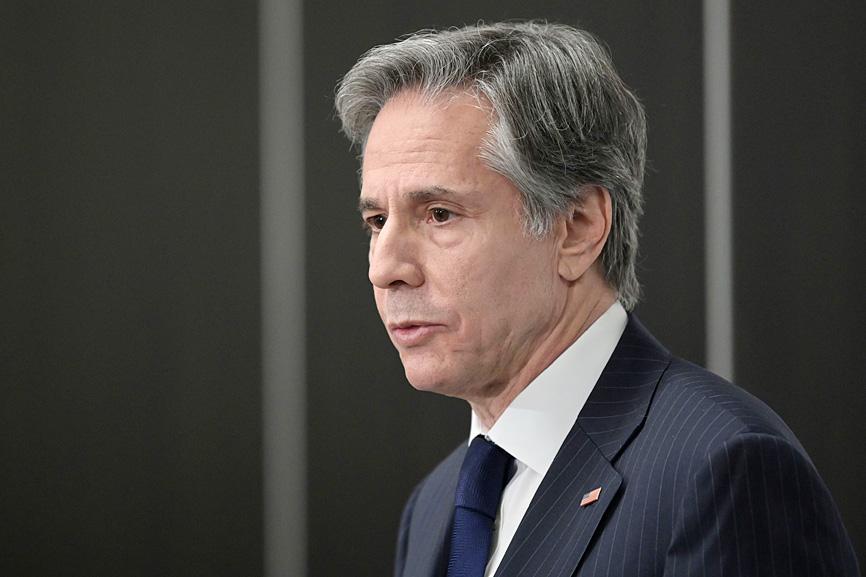US Secretary of State Antony Blinken told the Reuters Next conference on Friday that Chinese leaders should think carefully about their actions toward Taiwan, warning of “terrible consequences” if China precipitates a crisis across the Taiwan Strait.
In an interview, Blinken addressed multiple foreign policy challenges facing the administration of US President Joe Biden, including faltering efforts to repair the 2015 Iran nuclear deal, Russia’s military buildup near Ukraine and the spiraling conflict in Ethiopia.
Most acute might be China’s increasingly aggressive posture toward Taiwan.

Photo: Reuters
Minister of National Defense Chiu Kuo-cheng (邱國正) has said tensions with China are at their worst in more than 40 years, adding that China would be capable of mounting a “full-scale” invasion by 2025.
Asked whether China would ever invade Taiwan, Blinken said “that would be a potentially disastrous decision.”
China had been trying to change the “status quo” in the Taiwan Strait in the past few years by engaging in provocative military maneuvers and trying to isolate Taiwan from the rest of world, Blinken said.
“I hope that China’s leaders think very carefully about this and about not precipitating a crisis that would have I think terrible consequences for lots of people and one that’s in no one’s interest, starting with China,” Blinken said.
When it came to whether the US would defend Taiwan in the event of an invasion, Blinken said the US remained “resolutely committed” to Taiwan and to ensuring it had the means to defend itself.
“We’ve been very clear and consistently clear over many years that we are committed to making sure that Taiwan has the means to defend itself ... whether that’s in defense articles and services, we will continue to make good on that commitment,” Blinken said.
Blinken also praised Taiwan for its efforts to become a strong democracy, as well as cultivate a strong economy and innovation, adding that Taiwan had made significant contributions to the world.
In other news, the US and the EU on Friday in a joint statement reconfirmed their interest in stability and the “status quo” in the Strait.
The statement, issued after US Deputy Secretary of State Wendy Sherman and European External Action Service Secretary General Stefano Sannino led the first US-EU high-level consultations on the Indo-Pacific in Washington, also said that “both sides noted a shared interest in deepening cooperation with Taiwan consistent with their respective ‘one China’ policies.”
Additional reporting by CNA, with staff writer

MAKING WAVES: China’s maritime militia could become a nontraditional threat in war, clogging up shipping lanes to prevent US or Japanese intervention, a report said About 1,900 Chinese ships flying flags of convenience and fishing vessels that participated in China’s military exercises around Taiwan last month and in January have been listed for monitoring, Coast Guard Administration (CGA) Deputy Director-General Hsieh Ching-chin (謝慶欽) said yesterday. Following amendments to the Commercial Port Act (商港法) and the Law of Ships (船舶法) last month, the CGA can designate possible berthing areas or deny ports of call for vessels suspected of loitering around areas where undersea cables can be accessed, Oceans Affairs Council Minister Kuan Bi-ling (管碧玲) said. The list of suspected ships, originally 300, had risen to about 1,900 as

DAREDEVIL: Honnold said it had always been a dream of his to climb Taipei 101, while a Netflix producer said the skyscraper was ‘a real icon of this country’ US climber Alex Honnold yesterday took on Taiwan’s tallest building, becoming the first person to scale Taipei 101 without a rope, harness or safety net. Hundreds of spectators gathered at the base of the 101-story skyscraper to watch Honnold, 40, embark on his daredevil feat, which was also broadcast live on Netflix. Dressed in a red T-shirt and yellow custom-made climbing shoes, Honnold swiftly moved up the southeast face of the glass and steel building. At one point, he stepped onto a platform midway up to wave down at fans and onlookers who were taking photos. People watching from inside

Japan’s strategic alliance with the US would collapse if Tokyo were to turn away from a conflict in Taiwan, Japanese Prime Minister Sanae Takaichi said yesterday, but distanced herself from previous comments that suggested a possible military response in such an event. Takaichi expressed her latest views on a nationally broadcast TV program late on Monday, where an opposition party leader criticized her for igniting tensions with China with the earlier remarks. Ties between Japan and China have sunk to the worst level in years after Takaichi said in November that a hypothetical Chinese attack on Taiwan could bring about a Japanese

The WHO ignored early COVID-19 warnings from Taiwan, US Deputy Secretary of Health and Human Services Jim O’Neill said on Friday, as part of justification for Washington withdrawing from the global health body. US Secretary of State Marco Rubio on Thursday said that the US was pulling out of the UN agency, as it failed to fulfill its responsibilities during the COVID-19 pandemic. The WHO “ignored early COVID warnings from Taiwan in 2019 by pretending Taiwan did not exist, O’Neill wrote on X on Friday, Taiwan time. “It ignored rigorous science and promoted lockdowns.” The US will “continue international coordination on infectious